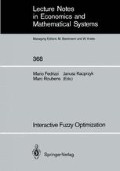Abstract
The paper is a survey of main notions and results obtained in fuzzy set theory with a special emphasise on its use in the modelling of natural language semantics. First, the concept of a fuzzy set and the main notions and operations related to fuzzy sets are presented and a connection of this theory with fuzzy logic is mentioned. Then, a brief overview of results in the modelling of natural language semantics using fuzzy sets is given.
Access this chapter
Tax calculation will be finalised at checkout
Purchases are for personal use only
Preview
Unable to display preview. Download preview PDF.
References
Bezdek, J., ed. (1987a) Analysis of Fuzzy Information — Vol. 1: Mathematics and Logic, CRC Press, Boca Raton, Fl.
Bezdek, J., ed. (1987b) Analysis of Fuzzy Information — Vol. 2: Artificial Intelligence and Decision Systems, CRC Press, Boca Raton, Fl
Bezdek, J., ed. (1987c) Analysis of Fuzzy Information — Vol. 3: Applications in Engineering and Science, CRC Press, Boca Raton, Fl.
Dubois D., and Prade H. (1980) Fuzzy Sets and Systems:Theory and Applications, Academic Press, New York.
Dubois D., and Prade H. (1988) Possibility Theory — An Approach to Computerized Processing of Uncertainty. Plenum Press, New York.
Esragh, F., Mamdani, E.H. (1979) A general approach to linguistic approximation, Int. J. Man-Mach. Stud., 11, 501–519.
Gupta, M.M., Yamakawa, T., eds. (1988) Fuzzy Computing: Theory, Hardware and Applications, North-Holland, Amsterdam.
Gupta, M.M., Yamakawa, T., eds. (1988) Fuzzy Logic in Knowledge-Based Systems, Decision and Control, North-Holland, Amsterdam.
Kuz’min, V. B. (1985) About semantical structure of linguistic hedges:an experimental hypothesis, BUSEFAL 24, 118–125, Université Paul Sabatier, Toulouse.
Lakoff, G. (1973) Hedges: A study in meaning criteria and logic of fuzzy concepts, J. Philos. Logic 2, 458–508.
Negoita C. V., and Ralescu D. A. (1975) Application of Fuzzy Sets to System Analysis. Birkhauser, Stuttgart.
Novák V. (1989a) Fuzzy Sets and Their Applications. Adam Hilger, Bristol.
Novák, V. (1989b) The Alternative Mathematical Model of Natural Language Semantics. Manuscript. Mining Institute, Ostrava 1989. (To be published by Cambridge University Press)
Novák V., and Pedrycz W. (1988) Fuzzy sets and t-norms in the light of fuzzy logic. Int. J. Man-Machine Stud. 29, 113–127.
Pavelka J. (1979) On fuzzy logic I, II, III. Zeit. Math. Logik Gurndl. Math. 25, 45–52, 119-134, 447-46
Sanchez E. (1976) Resolution of composite fuzzy relation equations. Inf. Control 30, 38–48.
Sgall, P., ed. (1984) Contributions to functional syntax, semantics, and language comprehension, Academia, Prague.
Sgall, P., Hajičová, E., Panevová (1986) J., The meaning of the sentence in its semantic and pragmatic aspects, D. Reidel, Dordecht.
Skala H. J., Termini S., and Trillas E., eds. (1984) Aspects of Vaguenes. Theory and Decision vol 39. D. Reidel, Dordecht.
Vopěnka P. (1979) Mathematics In the Alternative Set Theory. Teubner, Leipzig.
Yager R. R., ed. (1982) Fuzzy Set and Possibility Theory. Recent Developments. Pergamon Press, New York.
Zadeh L. A. (1965) Fuzzy sets. Inf. Control 8, 338–3
Zadeh, L.A. (1973) Quantitative Fuzzy Semantics, Inf.Sci., 3, 159–176.
Zadeh L. A. (1975) The concept of a linguistic variable and its application to approximate reasoning I, II, III. Inf. Sci. 8, 199–257, 301–357; 9, 43–80.
Zadeh L. A. (1978a) Fuzzy sets as a basis for a theory of possibility. Fuzzy Sets and Systems 1, 3–28.
Zadeh L. A. (1978b) PRUF — a meaning representation language for natural languages. Int. J. Man-Machine Stud. 10, 395–460.
Zadeh, L.A. (1983) A computational approach to fuzzy quantifiers in natural languages, Comp. Math. with Applic. 9, 149–184.
Author information
Authors and Affiliations
Editor information
Editors and Affiliations
Rights and permissions
Copyright information
© 1991 Springer-Verlag Berlin Heidelberg
About this chapter
Cite this chapter
Novák, V. (1991). Fuzzy Set Theory and Modelling of Natural Language Semantics. In: Fedrizzi, M., Kacprzyk, J., Roubens, M. (eds) Interactive Fuzzy Optimization. Lecture Notes in Economics and Mathematical Systems, vol 368. Springer, Berlin, Heidelberg. https://doi.org/10.1007/978-3-642-45700-5_1
Download citation
DOI: https://doi.org/10.1007/978-3-642-45700-5_1
Publisher Name: Springer, Berlin, Heidelberg
Print ISBN: 978-3-540-54577-4
Online ISBN: 978-3-642-45700-5
eBook Packages: Springer Book Archive

